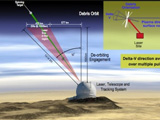|
|
TODAY.AZ / Weird / Interesting
Ground-based laser cannon to turn space debris into self-powered flaming de-orbiting rockets
28 October 2011 [13:16] - TODAY.AZ
 Another week, another scheme to clean up our bourgeoning space debris problem. This one, like many before it, calls for a powerful ground-based laser to remove orbital debris from low earth orbit. Using high-powered laser pulses fired from the ground, the system would create a small plasma jet emanating from the piece of junk itself, essentially turning each piece of debris into its own laser-powered rocket that would remove itself from orbit.
Another week, another scheme to clean up our bourgeoning space debris problem. This one, like many before it, calls for a powerful ground-based laser to remove orbital debris from low earth orbit. Using high-powered laser pulses fired from the ground, the system would create a small plasma jet emanating from the piece of junk itself, essentially turning each piece of debris into its own laser-powered rocket that would remove itself from orbit.The system, detailed in a paper released on arXiv last week, would rely on technologies already available or already under development. And unlike other ground-based laser systems proposed in past decades, it would be able to tackle both large and small pieces of space junk. A 33-foot telescope should do the trick, and a powerful enough laser isn’t out of reach, the authors of the paper claim.
Essentially, the heat from the laser--which would have to be targeted very precisely to intercept these extremely small objects whipping around the sky at many thousands of miles per hour--would vaporize a small part of each piece of space junk. The heat would be such that a small plasma jet would form, basically turning that piece of the space junk into fuel for a small jet that would push the debris out of orbit. Small piece of debris would burn up as their orbits decayed. Others would need to be carefully nudged out of orbit such that they end up landing in the Pacific Ocean.
The authors argue that a ground-based laser would obviate the need to launch any space junk-clearing spacecraft into orbit, which would cost hundreds of millions of dollars. Small pieces of junk could be cleared this way for a few thousand dollars. Larger pieces might cost up to $1 million.
Of course, laser-based approaches have been rejected out of hand previously based on the idea that they might also be used to target satellites in space during periods of hostilities. This scheme is likely headed for a similar fate. But at least someone is thinking about the problem, which as you read this is growing unchecked.
/Popular Science/
URL: http://www.today.az/news/interesting/97280.html
 Print version
Print version
Views: 1910
Connect with us. Get latest news and updates.
See Also
- 07 February 2026 [12:00]
Court allows Trump to detain immigrants without bond - 25 January 2026 [22:33]
Scientists solve 66 million-year-old mystery of how Earth’s greenhouse age ended - 20 January 2026 [14:34]
Spain train crash death toll rises to 41 after high-speed derailments - 19 February 2025 [22:20]
Visa and Mastercard can return to Russia, but with restrictions - 05 February 2025 [19:41]
Japan plans to negotiate with Trump to increase LNG imports from United States - 23 January 2025 [23:20]
Dubai once again named cleanest city in the world - 06 December 2024 [22:20]
Are scented candles harmful to health? - 23 November 2024 [14:11]
Magnitude 4.5 earthquake hits Azerbaijan's Lachin - 20 November 2024 [23:30]
Launch vehicle with prototype of Starship made its sixth test flight - 27 October 2024 [09:00]
Fuel prices expected to rise in Sweden
Most Popular
 Events in Sumgayit: it was necessary for everyone except Azerbaijan
Events in Sumgayit: it was necessary for everyone except Azerbaijan
 President Ilham Aliyev holds expanded meeting with Ethiopian PM
President Ilham Aliyev holds expanded meeting with Ethiopian PM
 First Lady Mehriban Aliyeva meets with First Lady of Ethiopia
First Lady Mehriban Aliyeva meets with First Lady of Ethiopia
 British Embassy in Baku reaffirms support for Azerbaijan’s territorial integrity
British Embassy in Baku reaffirms support for Azerbaijan’s territorial integrity
 Armenian "Ivan Vasilyevich": Seyran Ohanyan's wife may go to jail
Armenian "Ivan Vasilyevich": Seyran Ohanyan's wife may go to jail
 Beyond optics: How Israel–India partnership alters Pakistan and Iran’s calculus
Beyond optics: How Israel–India partnership alters Pakistan and Iran’s calculus
 Pakistan declares 'open war' with Taliban as jets bomb Kabul
Pakistan declares 'open war' with Taliban as jets bomb Kabul
